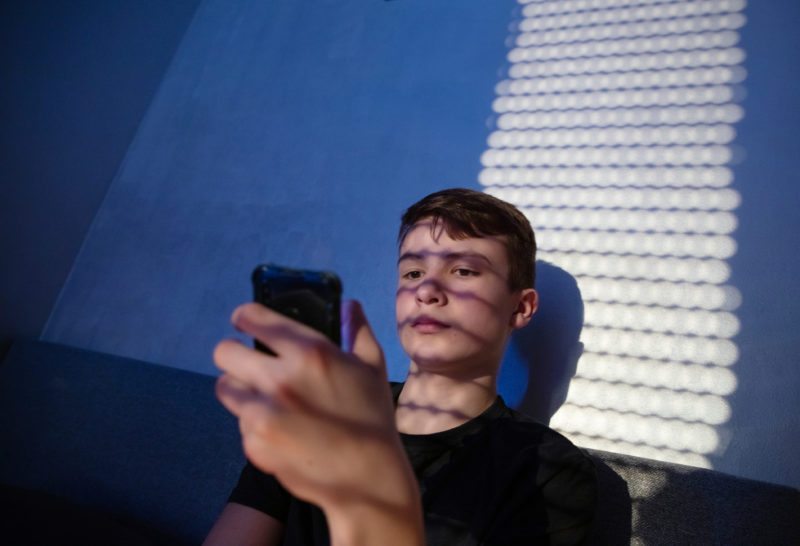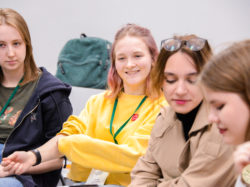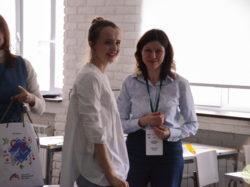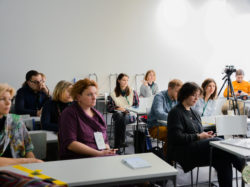Adolescents in a new reality
On April 5 and 6, the Moscow Higher School of Social and Economic Sciences hosted the annual conference “An Adolescent in the City.” This year’s event focused on the well-being of adolescents in the new, post-pandemic reality. What are the best ways of providing psychological support and crisis counseling to adolescents today? What approaches could mitigate and address the ever-increasing issue of violence in physical and virtual environments? How to empower teenagers to cope with the post-pandemic stress? What changes have recently affected the daily lives of young people in the city, family, school and on the Internet? Over 260 specialists from schools and universities, educational projects, healthcare institutions, museums, libraries, non-profit organizations and counselling services, as well as students participated in discussions of these and other issues of concern to the 21st century adolescents.
Youth as COVID-19 researchers

In his welcoming speech at the conference opening, Tigran Yepoyan, UNESCO Regional Adviser for Health Education, spoke about UNESCO’s Youth As Researchers (YAR) global initiative on COVID-19 engaging young researchers from 70 countries. They surveyed more than 10,000 peers and presented the findings to UNESCO Member States on March 25, 2022, at the UNESCO Headquarters.
The survey reveals that during the pandemic, serious disruptions of education were identified as the top stressor by 65% of young respondents worldwide. Almost one in five respondents reported problems with mental health and digital literacy. Three-quarters of the surveyed young people faced disinformation, almost a half experienced high uncertainty about their current and future prospects, and one in six lost their jobs. Despite these challengers, more than 70% of young people participated in social activism during the pandemic, volunteered and made donations towards the pandemic response.
In this context, Tigran Yepoyan stressed the importance of creating more opportunities for young people’s systemic involvement in advisory councils with public authorities, in conducting research, and in reforming the education system.
Cyberbullying and social media

There was a separate focus on the role of new media, such as social networks and online spaces, in adolescents’ lives. Despite their extensive first-hand experience with web-based interactions, young people can still be extremely vulnerable online. Therefore, the conference sessions held with UNESCO IITE support focused in particular on topics such as teen media, media literacy, and the risks adolescents may face online.
According to the panel of the session “(Cyber) bullying, hate speech, nihilism, and adolescents in the new information reality,” which included Grigory Misyutin, clinical psychologist, cognitive-behavioral therapist, coach, and founder of the Grigory Mislyutin Psychological Center; Ekaterina Kochneva, head of the Charity Department at VKontakte; Victoria Merzlyakova, Ph.D, Associate Professor of Cultural Studies at the RSU, RANEPA; and Alfiya Maksutova, producer of DVOR, teenagers today need to develop critical thinking skills to navigate their information space and adapt to the new, heavily charged atmosphere. While an important part of their lives – social media – has turned into a battlefield of opinions, young people are increasingly faced with online hate attacks and cyberbullying. Preventing and addressing cyberbullying may be a tough challenge given the tense emotional states of teenagers, their parents and teachers, as well as differences in outlook and information-seeking practices.
According to the session moderator Maria Medvedchikova, Program Assistant at UNESCO’s ICT in Health Education Unit,
The “new reality” has affected nearly all areas of teen life, from classroom lessons to social media memes. Adaptation is never easy; therefore, it has been rewarding to see experts from different – sometimes very different – areas being unanimous in their desire to support adolescents and their parents and to assist them in addressing the challenges they may face in this unpredictable time.
Such assistance includes the psychologist’s advice to be particularly aware of one’s mental health and to seek professional help promptly, if needed, and anti-bullying initiatives launched by Vkontakte to combat hate and aggressive behavior at the level of social network algorithms. Particularly interesting are the anthropological studies of digital behavior and the educational projects teaching young people to cope with stress using their emotional intelligence and critical thinking skills and to treat others with respect. I hope that our joint efforts will guide teenagers towards a healthy and constructive mindset.
Teen media and media literacy

During the panel session “How adolescents and media co-exist (and why it matters)”, the panelists discussed the role of young people in creating online media and their content. Although young people are active consumers of digital content, the teen media market in Eastern Europe and Central Asia is in decline, with most online publications for youth having been discontinued. A possible reason, according to the panelists, is that young people have little or no role in deciding on such media outlets’ agendas or creating their content. Engaging adolescents enables media to respond to the needs and interests of this demanding audience and to integrate important content naturally, without appearing insincere or manipulative.
One of the panelists, Yulia Buglak, marketing director of Mel and curator of the Mel.Teens project, stressed the importance of giving young people a meaningful role in co-creating media. “Teenagers should have a voice, because they are not only future but also current consumers of many media outlets intended for adults.” In addition, according to Yulia, learning teenagers’ perspectives can help adults, including parents, teachers and other professionals, to understand young people better. “No one can better explain the pains that teens are going through than the teens themselves,” Yulia summarized.
Alexandra Ilieva, UNESCO IITE Project Coordinator for digital projects on HIV and reproductive health education, spoke about the challenges of creating and supporting the online media TEENS.KG targeting young people in Kyrgyzstan. According to Alexandra, what teenagers and young people often search for online is not just information but a community of like-minded peers – which is particularly true of online forums raising sensitive or uncomfortable topics such as sexuality or violence, search for identity, or relations with adults.
TEENS.kg offers its users an accepting and supportive space which they do not always enjoy in their family, at school or even among friends. Without creating a safe space, even the most accurate and well-packaged information is unlikely to be fully absorbed by young people or made part of their outlook. Therefore, information is not the end in itself for such projects but one of the tools helping young people find a balance between their inner world and the realities of their environment.
Elina Turalyeva, chief editor of TEENS.kg, attributes the project’s success to its focus on normalizing a discussion of sex, love, health, and relationships as something relevant and necessary for people of all ages.
Teenagers and young people in Kyrgyzstan really needed a project such as TEENS. Things that we discuss there are hardly addressed anywhere else, except for private chatrooms or conversations with very few trusted people. We know that our content and atmosphere, as well as our friendly team, all help young people develop a better self-awareness and build healthy relationships. Our users trust us as their friends, mentors, sisters and brothers, and this trust gives them hope that not all is lost and they can always count on our support even if others turn away from them.
Ivan Pechischev, assistant professor at Perm University and author of training courses on media literacy, emphasized the importance of giving teenagers access to quality media literacy education. Such education can help them build critical thinking skills and protect from risks associated with consuming online media.

In conclusion, Yulia Plakhutina, UNESCO National Project Officer for Education and Health, noted:
Closing down some media outlets does not mean that adolescents will stop looking for information that interests them. One way or another, they will continue searching the internet – and what they may find there and how reliable such information may be is anyone’s guess. Therefore, we need to support the creation of open and safe platforms for young people where they can learn better ways to share their views, to make arguments, and to discuss their concerns. This, on one hand, may spark their future interest in quality journalism, and on the other hand, help them build basic media literacy skills and learn how to engage with media in a healthy way.
What is “An Adolescent in the City”?
Each year, the Non-profit Partnership for the Development of Children and Adolescents “Perekrestok Plus” (NP CADA “Perekrestok Plus”) conducts “An Adolescent in the City” conference to discuss various challenges faced by professionals helping young people, as well as the process of growing up and the daily lives of teenagers today.

The conference is organized with the assistance of:
- Institute of Social Sciences of the Russian Presidential Academy of National Economy and Public Administration (RANEPA);
- Institute of Education, National Research University Higher School Economics (NRU HSE);
- Moscow School of Social and Economic Sciences;
- Moscow State Psychological and Pedagogical University;
- UNESCO Institute for Information Technologies in Education (UNESCO IITE)
The next, 16th conference “An Adolescent in the City” is scheduled for April 4-6, 2023.
See more about the conference here (in Russian): https://conference.perekrestok.info/






